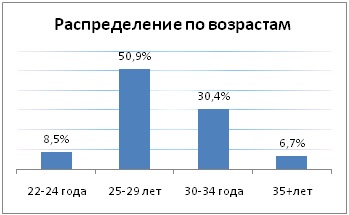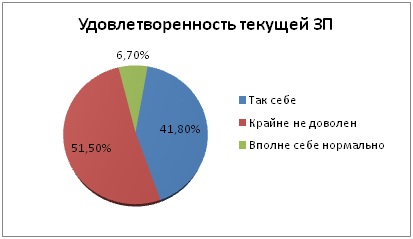Statistics on how Chinese programmers live and live

Hi hi friends. Today, Russia is actively cooperating with China in the field of IT-artificial intelligence, big data, and even plans to create a “Russian-Chinese digital valley”.
This article is a small digression into the Chinese market of IT vacancies and the life of Chinese programmers and is a compilation of translations of Chinese articles with my micro-comments. The statistics presented here will be useful to those who may be planning to work with China or in China, or if suddenly Chinese programmers are their target audience. Let’s see how they have it!
Vacancy situation
The data is taken from an article from the site www.csdn.net (this is the largest Chinese-language platform for IT professionals). The author has sparsed 90,000 job offers for the keyword “YaP”, and here’s what happened (data for November 2019):

The situation with salaries is strikingly different (in RMB / month):

What can you buy for such a lot of money
Here are the prices for November for some of the most common products for us (so that there is no cultural shock), for example, in Beijing, although admittedly, the prices there are not the highest:
tomatoes - 3 yuan / jin (yes, by the way, in China they hang jing - this is our pound with an error, so in rubles of kg of tomatoes there will be 3 * 2 * 9 = 54 rubles - in general, be on the Haymarket!)
potato - 1.52 yuan / jin
cabbage - 0.44 yuan / jin
rice - 2.71 yuan / jin
pork 25.8 yuan / jin
white meat of chicken - 14.85 yuan / pound
5.83 eggs (yes, yes, they are also sold in China by weight, not 9 each)
milk -2.5 yuan / 240 ml
95 gasoline - 7.19 yuan / liter (max)
bus - from 2 yuan per 10 km (+1 yuan for the next 5 km)
subway- 3 yuan; travel card gives a 50% discount
tomatoes - 3 yuan / jin (yes, by the way, in China they hang jing - this is our pound with an error, so in rubles of kg of tomatoes there will be 3 * 2 * 9 = 54 rubles - in general, be on the Haymarket!)
potato - 1.52 yuan / jin
cabbage - 0.44 yuan / jin
rice - 2.71 yuan / jin
pork 25.8 yuan / jin
white meat of chicken - 14.85 yuan / pound
5.83 eggs (yes, yes, they are also sold in China by weight, not 9 each)
milk -2.5 yuan / 240 ml
95 gasoline - 7.19 yuan / liter (max)
bus - from 2 yuan per 10 km (+1 yuan for the next 5 km)
subway- 3 yuan; travel card gives a 50% discount
Compared to the previous year, Python has the largest increase in job opportunities: a jump of __magic__37%! ( ref )
The situation with programming in Chinese
There is an article on Habr about national programming languages bmforce , and by the way I will give a couple of examples for China: the local language Easy (易), as well as Chinese Python (with changes in the main parser), which, by the way, has turned into a “boa-python in China” ". Interestingly, a number of keywords exist in synonyms; so and, self, in, True, False, break, etc. are presented in two versions. Work is boiling over the translation of official Python documentation into Chinese. ( Translation progress by version ).
But Chinese PLs exist, rather, for educational purposes. Junior + programmers already write in English. But the main thing is the knowledge pool, and here, in addition to English resources, Chinese popular IT sites come to the rescue
IT sites
such as www.csdn.net (mentioned just above), www.iteye.com , segmentfault.com , www.chinaunix.net , www.tuicool.com and many others, not to mention the numerous QQ and Weixin (" Wechat ”in our opinion) communities.
Collected data
In general, the three main questions that the Chinese ask immediately after you voiced your name are: how old are you, married / how much you earn. And in the colorful statistics presented below, collected for the first half of 2019 on the JetBrains 、 Hired 、 HackerRank 、 极光 大 数据 ( Aurora Big Data ) and other platforms, the Chinese programmers themselves had to answer these questions as well. The study involved 39,000 programmers (I hope this is a representative sample for China). So…
Language distribution
The most common programming language in China today is Java (we already noticed this from the vacancies), Go is named the most promising, and Python is the first by the number of students learning it.
83% of developers in China today opt for Java 8, and Spring Boot has already become a popular web development framework.
There are a lot of strong JavaScript front-end developers and Java backend developers in China now. And now, front-end engineers are in great demand on the market. In addition, Android app developers now occupy 15.2%.
Programming habits
Programmers prefer dark colors, 89% customize the IDE in one way or another, and most prefer dark colors, choose a dark theme for the editor.
77% of programmers said they can listen to music while programming, and their favorite genres are electronic music, pop and rock.
The survey showed that developers 25 years and older tend to work remotely.
Knowledge of programming languages
Each developer knows 4 languages on average and wants to learn 4 more languages.
Young developers aged 18-24 are planning on average to learn 6 languages, older developers - 35 years and older - plan to learn another 3 languages
73.7% said that programming training is mostly self-learning.
More than 15% started learning programming before the age of 16.
76% of programmers believe that participation in continuing education courses will be useful in finding a job; 24% do not see this as necessary.
Distribution in China
The largest number of developers works in the very south of China - in the province of Guangdong.
Why is that
Since the 16th century, trade with Chinese jewelry, silk and porcelain, was in full swing here with Europeans. And then more: today it is China's largest importer and exporter, the most open and most dynamically developing investment environment. Here is the city of Shenzhen, well known for its electronic industry. And Guangdong's GDP = Russia's GDP.
This is one of the most revolutionary regions: it was here that one of the first communist circles in China was organized. It remains revolutionary to this day: it is here that all technological developments and trade economic experiments are carried out.
This is one of the most revolutionary regions: it was here that one of the first communist circles in China was organized. It remains revolutionary to this day: it is here that all technological developments and trade economic experiments are carried out.
If you look at the cities, the leaders are Beijing with 14.5% of all developers, Shanghai - with 13.9% ; followed by Hangzhou - “China Silicon Valley”, where Alibaba Group is headquartered, including Shenzhen and Guangzhou ( just both in Guangdong), Chengdu, Nanjing, etc.
Distribution by age and gender
A little more than half of the programmers are 25-29 years old, and over 35 years old - very few.

Many programmers think about what they will do after 35 except programming, they acquire knowledge and skills in other areas, and after 35 years they can gradually transfer to architecture, management or other positions.
The ratio m: w = 12: 1.
Opening hours
Working overtime is the norm. On March 26, 2019, a repository of companies supporting the 996 system was posted on Github, which violates Chinese labor laws. Already on April 9, the repository received 200 stars and became the most popular repository. But he was bombarded with spam and blocked in China. "996" - guessed? From 9am to 9pm 6 days a week.
On average, programmers work 47.7 hours a week, and programmers work 45.9 hours.
33.5% of programmers work more than 60 hours a week.
Programmers have the longest working days in Shanghai, Beijing and Guangzhou. Shanghai programmers are the busiest: an average of 48.9 hours per week. In Shenzhen and Chengdu - an average of 47.0 hours a week.
Average salaries
The average salary in the country is 150,000 yuan, the average age of programmers with a salary of 400,000 yuan or more is 36 years.
In Shanghai, 16.9% of programmers get 20,000 yuan or more per month.

Here is a clear picture of the distribution of salaries per year. This one that looks like B - 万 is 10,000.
Are programmers happy with their salary?

The proportion of programmers who feel that the salary is so-so, or unhappy, is 93.3%.
50% of software architects / system analysts are satisfied with their current RFP.
41.4% of programmers are worried about their salaries and raising the level of knowledge and qualifications.
Change of job
78.5% changed their place of work, while earnings increased.
The most common reasons are the lack of development opportunities, the mismatch of the real situation in the company with expectations, and the transition to a higher salary ratio.
Health and Sports
1/4 of the programmers go in for sports less than once a month.
58.3% of programmers go in for sports once a week or more.
44.4% of middle and senior managers of the companies surveyed go in for sports twice a week or more. The more a position is associated with management, the more sport.
Most of all, sports programmers from Shanghai, Guangzhou and Chengdu love sports: about 40% of programmers from these cities go in for sports twice a week, and go to bed mainly from 11 a.m. to 1 a.m.
63.3% of programmers surveyed currently complain of some symptoms of poor health, and 34.8% of programmers regularly experience fatigue.
The main problems are regular fatigue, diseases of the cervical spine, excess weight.
60% of programmers do not eat breakfast regularly, and 20% of programmers do not eat breakfast,
and for the Chinese, breakfast is not a cup of coffee.
From the very early morning all kinds of street stalls and cafes are boiled, steamed, fried all kinds of cereals, noodles, eggs, pies, squeezed juices from carrots, chumiza, beans - so skipping breakfast is very serious.
Personal life
42% of programmers are single: 42.5% of male programmers and 35.6% of women.
The main criterion for choosing a second half is appearance (ta-daaa), they also pay attention to hobbies and educational level, while the economic level, family, nature of work, growth and registration at the place of residence (hukou) are not so important.
Moving around the city
61.6% of programmers travel by public transport and metro.
9.7% use bike sharing (apparently, it’s like “a wealthy company will rent a hole punch”.)
7.4% drive a private car to work.
57.8% of programmers do not have a car, and they are not going to buy it; 22.3% of respondents are going to buy a car in the near future.
Housing situation
75.6% of programmers rent housing.
12.9% live in their own purchased apartments.
The remaining company provides housing or they live with their parents.
Nearly 50% of programmers rent housing for 1,500 yuan or more
Lifestyle and habits
57% of programmers prefer coffee (it's in China!), 33% - tea, 10% - neither one nor the other.
84% of programmers still program on weekends.
80% of programmers prefer FILCO, Cherry, HHKB Pro2 keyboards.
In their free time, 42.5% of programmers can surf the Internet and deepen their knowledge of work. 47.7%; prefer to spend time sleeping, watching movies, etc., 40.7% of programmers said they were playing games.
Most preferred games are simulations and strategies.
52% said that it happens that they see a code in a dream, and 17% said they see such dreams very often.
33% of the surveyed programmers love dogs, and cats - 26%, and those and those - 23%.
But most programmers get cats because of the nature of the work.
Instead of an afterword
As a result and generalization of everything that we talked about today - the section "Programmers are joking" - a couple of the most fun answers from questionnaires to collect all the statistics above. As you know, every joke has a fraction of a joke.
But what did I spend all the time on? Looks like looking for bugs ...- to a question about marital status.
Now it’s clear why there are so many lonely people!- to the fact that a large percentage of programmers in their free time devote to films and toys.
About personal car:
Maserati recently dropped in price to 500,000 yuan, and for me on a ticket for 10 yuan everything will be green!About workload:
I rent housing only to come and spend the night, and so that my cat lives there.
Work is like feelings: it is not a fact that in the end you choose what you love more.